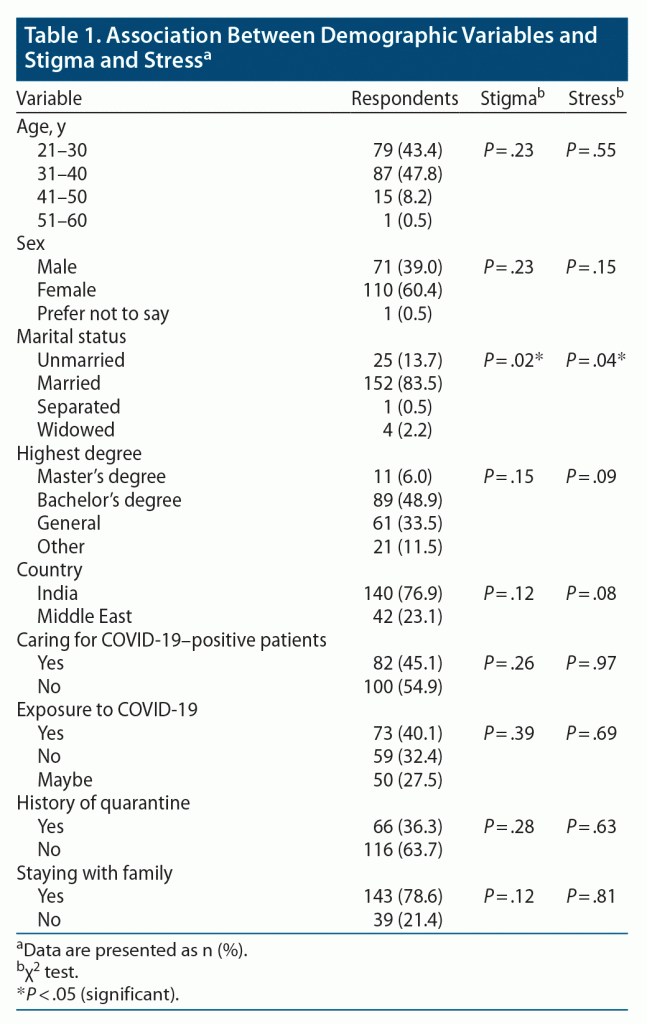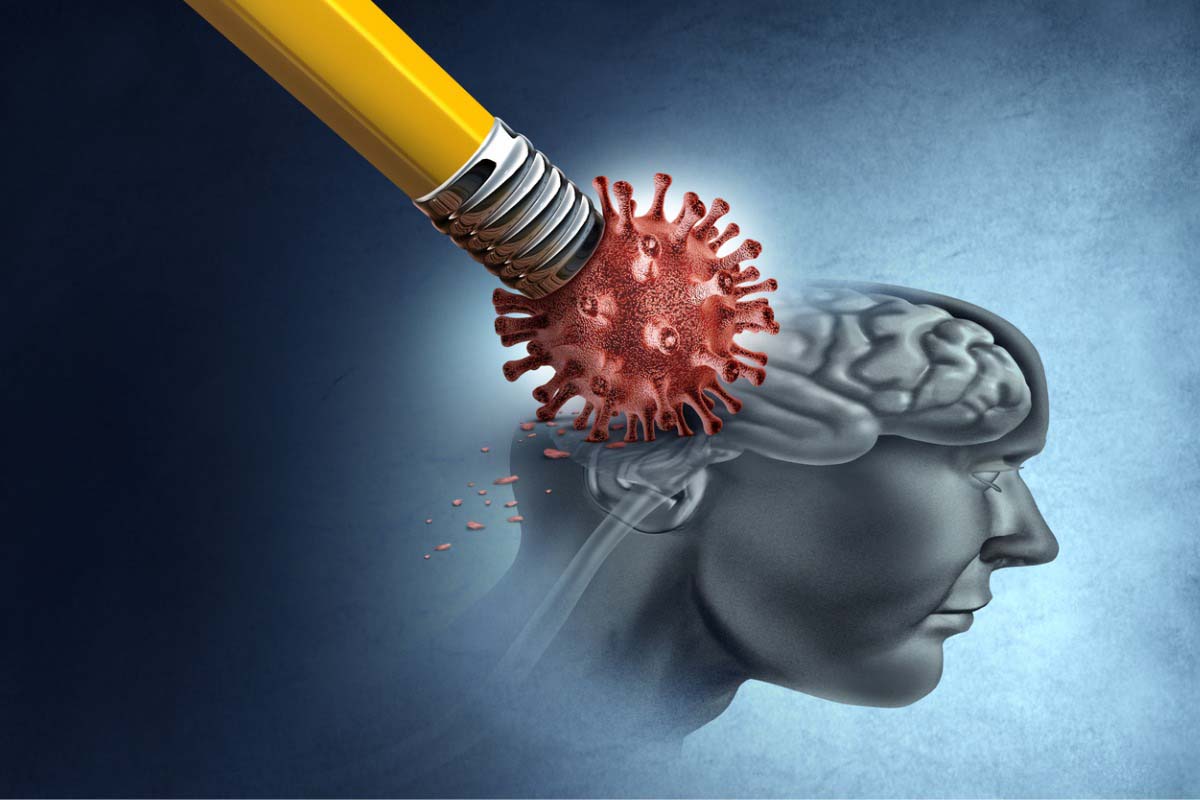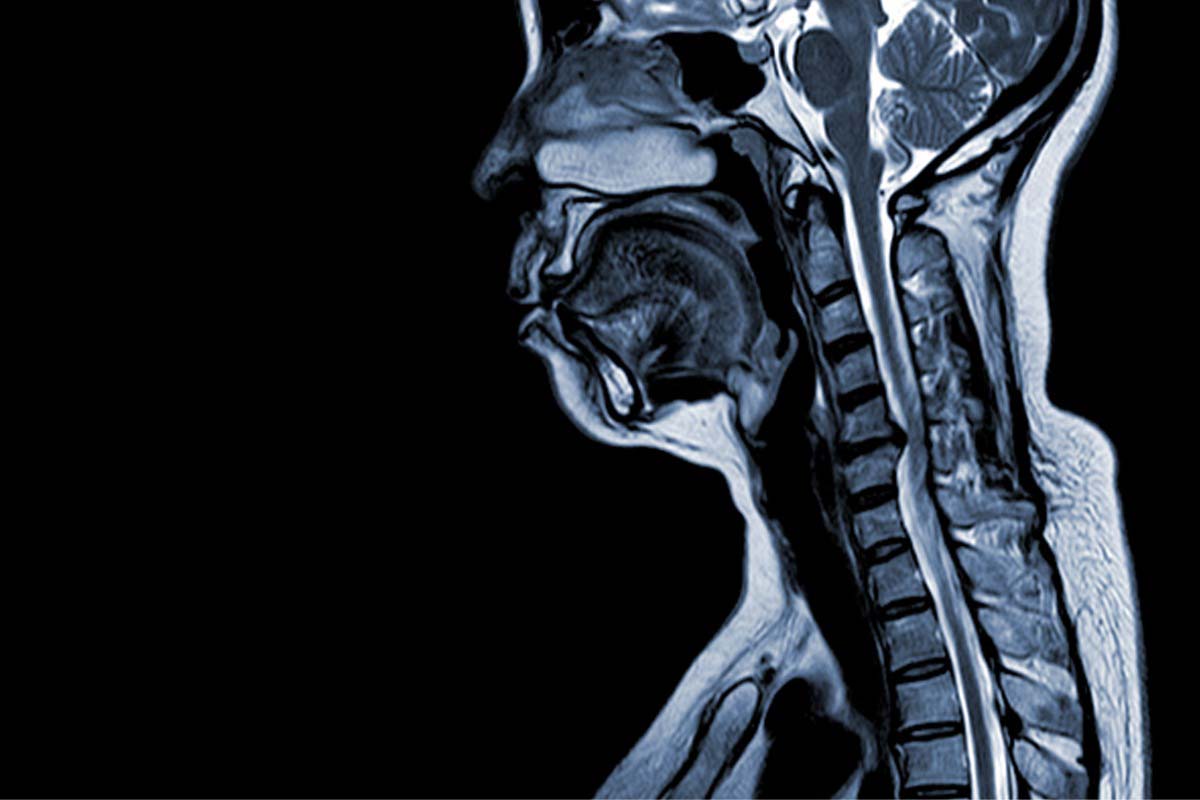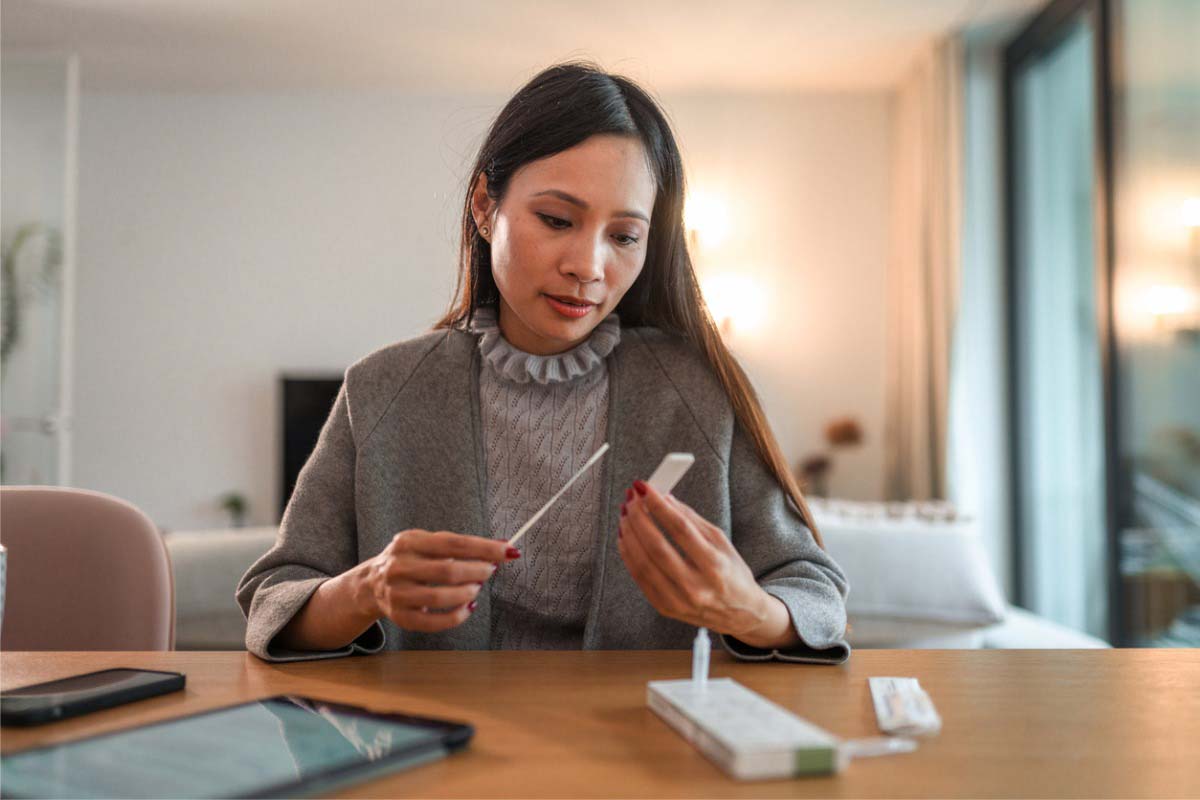
Prim Care Companion CNS Disord 2022;24(1):21br03031
To cite: Uvais NA, Nalakath MJ. Perceived stress and stigma among nurses: a comparative study between nurses working in India and the Middle East. Prim Care Companion CNS Disord. 2022;24(1):21br03031.
To share: https://doi.org/10.4088/PCC.21br03031
© Copyright 2022 Physicians Postgraduate Press, Inc.
aDepartment of Psychiatry, Iqraa International Hospital and Research Centre, Calicut, Kerala, India
bDepartment of Hospital Administration, Iqraa International Hospital and Research Centre, Calicut, Kerala, India
*Corresponding author: N. A. Uvais, MBBS, DPM, Iqraa International Hospital and Research Centre, Calicut, Kerala, India ([email protected]).
The coronavirus disease 2019 (COVID-19) pandemic has affected health care workers, especially nurses, worldwide due to the rapid increase in workload and the serious risks associated with contracting the infection, especially in countries with limited resources such as India. Moreover, research1 from around the world also reported significantly higher psychological stress among nurses compared to other hospital staff. Media reports suggest that nurses have also faced significant stigma related to COVID-19 from their friends, relatives, neighbors, and the public.2 There are no studies, to the best of our knowledge, comparing stigma and stress among nurses working in different countries to date.
Methods
This was a cross-sectional survey study. An online self-report questionnaire was designed using Google Forms. In addition to demographic data, there was a list of COVID-19 pandemic–related questions. A stigma scale that measures the perceived stigma of nurses regarding COVID-19 was used. The scale comprises 13 items, each of which is scored on a 5-point Likert scale. The total score ranges between 0 and 52, with a higher score indicating that the doctors perceived greater stigma.3 Stress among the nurses was assessed with the 10-item Perceived Stress Scale (PSS-10),4 consisting of 10 items, each of which is scored on a 5-point Likert scale. The total score ranges between 0 and 40, with a higher score indicating higher perceived stress.
A link to the questionnaire was sent through WhatsApp and other social media platforms to the contacts of the investigators working as nursing staff in hospitals in India and Middle Eastern countries. The participants were encouraged to forward the survey to other nurses working in the hospitals. Consent for participation was granted when the voluntary survey was answered. The study complied with the Declaration of Helsinki. The data collection was initiated on August 21, 2020 at 9 pm IST.
Results
We received 182 responses between August 21, 2020, and August 28, 2020. The sociodemographic details are summarized in Table 1. Most of the respondents (91.2%) were between the ages of 21 and 40 years, 60.4% were female, 85.5% were married, and 48.9% had a bachelor’s degree in nursing. Of the respondents, 140 (76.9%) were working in India, whereas 42 (23.1%) were working in Middle Eastern countries, and 42.3% had 6–10 years of work experience. Also, 45.1% of the respondents were caring for COVID-19–positive patients in their workplace, 40.1% had exposure to COVID-19–positive cases, 36.3% reported history of quarantine in the past, and 78.6% were staying with their families.
The mean stigma score was 29.15 (SD = 8.13). Of the respondents, 130 (71.4%) reported a stigma scale score ≥ 26, indicating higher levels of perceived stigma, whereas 73 (40.1%) of the respondents reported a score ≥ 20 on the PSS-10, indicating higher levels of stress. The mean PSS-10 score was 18.17 (SD = 4.99). Pearson correlation showed a significant association (0.397, P < .001) between stigma score and PSS-10 score. There was a significant association between stigma and marital status, with married participants reporting higher stigma (χ2 = 10.04, df = 3, P = .018), and between perceived stress and marital status, with married participants reporting higher stress (χ2 = 9.96, df = 3, P = .019). There was no statistically significant difference in the levels of stress or stigma between nurses working in India and Middle Eastern countries.
Discussion
The study results show that 71.4% of nurses perceive significant COVID-19–related stigma and 40.1% of nurses also perceive significant stress. However, there was no significant difference in the levels of stress or stigma between nurses working in India and Middle Eastern countries. A similar study5 conducted among Indian doctors working in the private sector found similar stigma (66.7%) and stress (42.5%) levels. However, another Indian study among doctors working in COVID-19–designated hospitals found significantly higher stress levels (63.8%).3 A similar study2 conducted among 335 dialysis staff in India, of which 44.8% were dialysis nurses, found significantly lower levels of stigma (54.6%) and stress (36.1%). A summary of all these study findings indicates that health care workers in various settings perceive significantly higher COVID-19–related stigma than stress during the COVID-19 pandemic. Previous studies6 also found that COVID-19–associated stigma can result in higher stress, fatigue, and burnout and lower satisfaction, leading to poor quality work and health care dysfunction. Our study findings demand urgent measures from government and policy makers to implement proactive antistigma programs to protect nursing and other health care staff so that they can maintain their high-quality work without losing their motivation and commitment during the COVID-19 pandemic.
Received: June 1, 2021.
Published online: January 27, 2022.
Potential conflicts of interest: None.
Funding/support: None.
References (6)

- Pappa S, Ntella V, Giannakas T, et al. Prevalence of depression, anxiety, and insomnia among healthcare workers during the COVID-19 pandemic: a systematic review and meta-analysis. Brain Behav Immun. 2020;88:901–907. PubMed CrossRef
- Uvais NA, Aziz F, Hafeeq B. COVID-19-related stigma and perceived stress among dialysis staff. J Nephrol. 2020;33(6):1121–1122. PubMed CrossRef
- Uvais NA, Shihabudheen P, Hafi NAB. Perceived stress and stigma among doctors working in COVID-19–designated hospitals in India. Prim Care Companion CNS Disord. 2020;22(4):20br02724. PubMed CrossRef
- Cohen S, Williamson G. Perceived stress in a probability sample of the United States. In: Spacapan S, Oskamp S, eds. The Social Psychology of Health: Claremont Symposium on Applied Social Psychology. Newbury Park, CA: Sage; 1988:31–67.
- Uvais NA, Shihabudheen P, Bishurul NA, et al. COVID-19–related stigma and stress among doctors working in private sector during the COVID-19 pandemic. Prim Care Companion CNS Disord. 2021;23(5):21br02956. PubMed CrossRef
- Giorgi G, Lecca LI, Alessio F, et al. COVID-19–related mental health effects in the workplace: a narrative review. Int J Environ Res Public Health. 2020;17(21):7857. PubMed CrossRef
Enjoy this premium PDF as part of your membership benefits!






